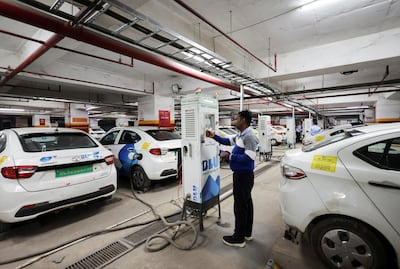India has discovered 5.9 million tonnes of lithium reserves in the Himalayan Jammu and Kashmir region, the first time significant deposits of the metal have been detected in the country.
Lithium is a soft, silvery-white non-ferrous metal that is a key component in batteries, including for electric vehicles.
The Ministry of Mines said that the metal was found in Reasi district of the union territory. A small reserve was discovered in the southern state of Karnataka in 2021.
"Geological Survey of India for the first time established lithium inferred resources (G3) of 5.9 million tonnes in the Salal-Haimana area of the Reasi district of Jammu and Kashmir," the ministry said on Thursday.
"G3" is a geological term indicating the discovery is from a preliminary stage of exploration of the area.
India is currently dependent on lithium imports. It has identified two lithium mines for long-term lease in Argentina, which has about 19 million tonnes of identified reserves, with an assessment due to be completed by the end of this month.
The find in Jammu and Kashmir is a major boost for the government's plan to promote the use of electric vehicles (EVs) in the country to "reach the next level for energy independence".
India has been scouting for lithium reserves due to growing demand amid a push to boost the adoption of EVs in both public and private transport.

Prime Minister Narendra Modi’s government has committed to reducing the emissions intensity of India's gross domestic product by 45 per cent and derive about 50 per cent of cumulative electric power installed capacity from non-fossil fuel energy resources by 2030.
More than a million EVs were sold in the country last year and sales are expected to pass 10 million units annually by 2030, according to a recent report by the Finance Ministry.


